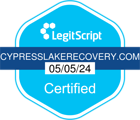Substance Use Treatment With Support for Co-Occurring OCD
Cypress Lake Recovery specializes in supporting individuals with substance use concerns. Individuals enter our program with a substance use diagnosis, and for those who also experience obsessive-compulsive disorder (OCD), we offer integrated dual-diagnosis care that supports recovery while addressing co-occurring mental health symptoms.
OCD can intensify substance use behaviors and complicate recovery when left unaddressed. Treating both conditions together helps individuals build healthier coping strategies and reduce relapse risk.

Understanding OCD in Substance Use Recovery
OCD is characterized by intrusive thoughts and compulsive behaviors intended to reduce distress. Many individuals turn to substances in an attempt to manage anxiety or intrusive thinking, which can strengthen the cycle of both conditions.
At Cypress Lake Recovery, OCD symptoms are addressed when they occur alongside substance use, with treatment focused on supporting sobriety and emotional regulation.
Contact Our Admissions Team Today
Co-Occurring Mental Health Conditions
Our dual-diagnosis approach helps individuals understand how mental health symptoms interact with substance use patterns.


Integrated Treatment at Cypress Lake Recovery
Therapy Approaches
Clients may participate in:
- Individual Therapy
- Cognitive Behavioral Therapy (CBT)
- Dialectical Behavior Therapy (DBT)
- EMDR Therapy
Therapy focuses on managing intrusive thoughts, reducing compulsive behaviors, and strengthening recovery-oriented coping skills.
Testimonials
![]()
![]()
![]()
![]()
![]()
Regina
I am so happy that I chose Cypress to begin my recovery. I have suffered for years from depression, anxiety, panic disorder, and PTSD. The programs that are offered here at Cypress have been truly phenomenal in helping me recover. I also appreciated the professional staff that are here on duty 24/7, which helps create a safe environment. Cypress Lake Recovery uses effective “one on one” methods that meet each person’s individual needs because they evaluate and have a better understanding of your personal traumatic experiences. Thanks Sabino, I am truly grateful to you and the Cypress family.
![]()
![]()
![]()
![]()
![]()
J.A.
A beautiful facility! Staff sets the tone and kindness that residents easily follow. Thank you, Cypress Lake Recovery!
![]()
![]()
![]()
![]()
![]()
Pamela
The program at Cypress Lake Recovery works! I emerged from an accumulation of unrecognized emotions, issues of trust, and unresolved grief and loss. 35-days of effective integration of customized quality therapy reconnected my mind, body, spirit, and I am worth it! I had masked emotions and hurtful events for decades with alcohol. At Cypress Lake Recovery I safely focused deep within to unleash harmful secrets and self-degradation. Tools of recovery were practiced, not just presented. Integrative therapies were tailored to my circumstances, thus were effective. This residential program is like no other. For me, Cypress Lake Recovery delivered what was professed. I am forever grateful for this gift of healing.
![]()
![]()
![]()
![]()
![]()
Mike
Life changing experience. Wonderful staff. Wonderful program. Thanks for everything!
![]()
![]()
![]()
![]()
![]()
Darcy
It was great to begin my recovery in a group environment with so many knowledgeable nurses, therapists, BHT’s, and others around for support. The equine therapy, challenge course, family week, and daily therapies all work together seamlessly, allowing me to leave Sabino as a healthier and stronger person!
Recovery Skills and Aftercare
Ongoing recovery support includes:
Nationally Recognized & Accredited






Begin Substance Use Treatment With Dual Diagnosis Support
If substance use and OCD symptoms are occurring together, Cypress Lake Recovery provides integrated care designed to support long-term sobriety
Contact our admissions team to determine if our program is the right fit.



